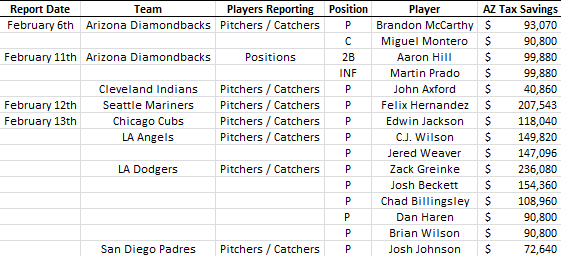
This Sunday, the biggest names in the film industry will gather at LA’s Dolby Theatre for the 86th presentation of The Oscars. While this will be a big day for those involved in creating this year’s hit films such as American Hustle, The Wolf of Wall Street, and 12 Years a Slave it will also be a big day for two organizations with no involvement in creating any (good) films: the IRS and California’s state version of the IRS – the Franchise Tax Board (FTB).
Gift or “swag” bags have been a common consolation prize for anyone who doesn't win an award. The Oscars go above the standard and runner-ups have the opportunity to get an “official” gift bag from the Academy of Motion Picture Arts and Sciences (AMPAS) as well as an “unofficial” gift bag coordinated by an L.A. marketing firm – Distinctive Assets.
Gift or “swag” bags have been a common consolation prize for anyone who doesn't win an award. The Oscars go above the standard and runner-ups have the opportunity to get an “official” gift bag from the Academy of Motion Picture Arts and Sciences (AMPAS) as well as an “unofficial” gift bag coordinated by an L.A. marketing firm – Distinctive Assets.
US Weekly detailed the unique items in this year’s bags which include the following:
Losing an Oscar means “winning” a consolation gift bag which means paying $42,320 in taxes just for losing. In addition, these 121 nominees will bring tax organizations $4.11MM at the Oscars this Sunday just from gift bags alone.
What happens if you are one of the lucky ones to walk away with an Oscar instead of a gift bag? You would owe the IRS and FTB 53% of the fair market value of the Oscar trophy. This amount is not readily available because the AMPAS has required all winners since 1950 to enter into a legal contract requiring winners to offer the Academy the Academy Award for $1 if the winner or their estate ever wishes to resell the trophy. The last Academy Award to be sold to someone besides the Academy, sold in a 2011 auction for $861,542.
If that happened to be the value the IRS and FTB used to calculate tax owed to them by Oscar winners – each winner would owe a total of $456,000 in taxes per Oscar.
In addition to taxing these gift bags, the IRS makes sure to let you know they will be taxing them. Since 2006, the IRS and AMPAS reached an agreement that requires the Academy Awards to pass out applicable tax forms as reminders with the gift bags. However, the actors and actresses aren't at a total loss; they can follow George Clooney’s footsteps and donate their gift bag to charity and receive a tax deduction for doing so.
- Pure Organic Maple Syrup
- Two-day train journey through the Rocky Mountains
- Hydroxycut gummies, and personal training sessions
- Trip to tour by foot in Japan
- Trip to Las Vegas to meet Boyz II Men
- Hair restoration and/or transplant surgery
- Home spa systems
- Water filtration system
- Resort packages
- and pet products
Losing an Oscar means “winning” a consolation gift bag which means paying $42,320 in taxes just for losing. In addition, these 121 nominees will bring tax organizations $4.11MM at the Oscars this Sunday just from gift bags alone.
What happens if you are one of the lucky ones to walk away with an Oscar instead of a gift bag? You would owe the IRS and FTB 53% of the fair market value of the Oscar trophy. This amount is not readily available because the AMPAS has required all winners since 1950 to enter into a legal contract requiring winners to offer the Academy the Academy Award for $1 if the winner or their estate ever wishes to resell the trophy. The last Academy Award to be sold to someone besides the Academy, sold in a 2011 auction for $861,542.
If that happened to be the value the IRS and FTB used to calculate tax owed to them by Oscar winners – each winner would owe a total of $456,000 in taxes per Oscar.
In addition to taxing these gift bags, the IRS makes sure to let you know they will be taxing them. Since 2006, the IRS and AMPAS reached an agreement that requires the Academy Awards to pass out applicable tax forms as reminders with the gift bags. However, the actors and actresses aren't at a total loss; they can follow George Clooney’s footsteps and donate their gift bag to charity and receive a tax deduction for doing so.
Want more? Sign up to receive TaxaBall Income posts by email, follow on twitter or like us on Facebook.




 RSS Feed
RSS Feed